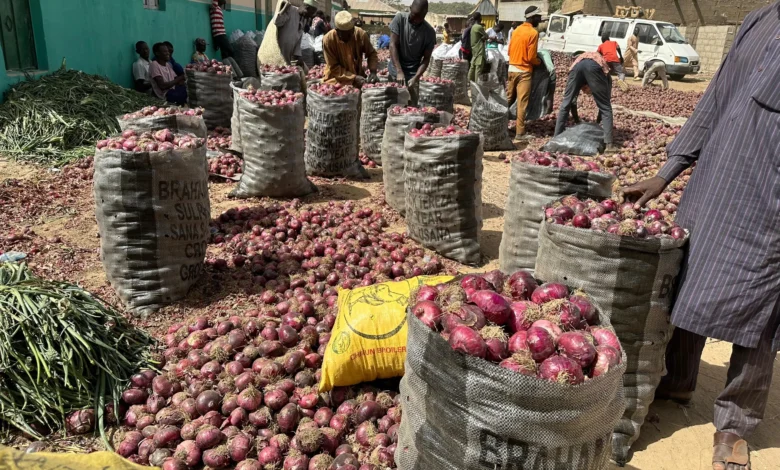Nigerian Onion Farmers Face Over 50% Post-Harvest Losses, Warn of Impending Price Hikes

Nigeria’s onion producers are sounding the alarm over a storm of challenges threatening the industry, with crippling post-harvest losses, soaring production costs and the devastating impacts of climate change converging to undermine the sector’s stability.
In a recent press conference in Sokoto, Alhaji Aliyu Maitasamu, the President of the National Onion Producers, Processors, and Marketers Association of Nigeria (NOPPMAN) and the Regional Observatory of Onion Sector in West and Central Africa (ROO/WCA), painted a bleak picture of the onion value chain’s current state.
Staggering Post-Harvest Losses
Maitasamu revealed that onion farmers across the country are experiencing post-harvest losses exceeding 50% of their total production. This monumental waste is largely attributed to inadequate storage facilities, limited preservation technology and unreliable transportation infrastructure.
“This means more than half of our production is wasted after harvest due to inadequate storage, limited preservation technology, and unreliable transportation,” Maitasamu stated. This trend is not only harmful to the livelihoods of our farmers but also undermines the country’s larger economic interests.
Skyrocketing Production Costs
The challenges facing Nigeria’s onion farmers extend far beyond post-harvest losses. Maitasamu noted the surge in production costs, with the price of essential inputs like seedlings, fertilizers, pesticides, fuel and labour reaching unprecedented levels.
“Over recent months, the cost of onion seedlings has surged to unprecedented levels, drastically impacting our production capacity,” the NOPPMAN president explained. “If farmers cannot afford to cultivate, our output will decline, prices will rise, and ultimately, food security across the nation will be at risk.”
This financial strain is crippling the ability of farmers to maintain their operations, let alone invest in new technologies or expand their production. Maitasamu warned that the industry’s profitability is being eroded, and many growers are struggling just to break even.
“This financial strain hampers farmers’ ability to maintain operations and discourages investments in new technologies or expansion,” he added.
The Threat of Climate Change
In addition to the economic pressures, Nigeria’s onion farmers are also grappling with the disruptive effects of climate change. Maitasamu revealed that unpredictable weather patterns, extended rainy seasons, and other unusual climate events are wreaking havoc on traditional onion-growing cycles.
“Excessive rainfall has led to crop diseases, waterlogging, and poor harvests, leaving farmers unable to plan effectively,” Maitasamu stated. “As our farmers contend with these unpredictable conditions, their ability to plan, plant, and harvest effectively is compromised, leaving the entire industry vulnerable.”
These climate-related challenges further exacerbate the industry’s woes, making it increasingly difficult for farmers to maintain consistent production and reliable supply chains.
Calls for Urgent Intervention
Maitasamu has issued a clarion call for intervention and support from the government, development partners, financial institutions, and the private sector.
“The declaration of a state of emergency in the onion industry is a call to action to strengthen its resilience, safeguard farmers’ livelihoods, and secure Nigeria’s place in both national and global markets,” he emphasized.
Maitasamu believes that a coordinated, multi-stakeholder approach is required to address the industry’s pressing issues. This could involve policy initiatives, financial aid and targeted investments in infrastructure and technology to mitigate post-harvest losses, reduce production costs, and build climate resilience.
He urged the government, development partners, financial institutions and the private sector to support the onion industry and help it overcome these challenges.
The stakes are high, as the health of the onion industry has far-reaching implications for Nigeria’s food security and broader economic stability. As the country’s onion producers confront this multifaceted crisis, the need for a comprehensive, collaborative response has never been more urgent. The future of Nigeria’s onion industry and the livelihoods of the millions it supports, hang in the balance.





3 Comments